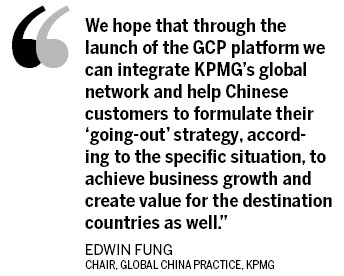Showing the way as more look abroad
Updated: 2011-12-15 07:55
By Wei Tian (China Daily)
|
|||||||||

XIAMEN, Fujian - The investment exchanges between China and the global market should extend more to private sectors, especially involving small and medium-sized enterprises (SMEs), international accounting company KPMG said.
Edwin Fung, chair of KPMG's Global China Practice (GCP), said his department is keen to provide aid to such foreign direct investment in China and the country's outbound direct investment.
"The top 100 companies in the US must have all set up their branches in China, but many SMEs, even if they have large businesses in a state, are not yet aware of the Chinese market," Fung said.
"It's a similar trend in China: In our client base where there used to be mainly State-owned enterprises, there are now more and more private companies consulting about their 'going-out' strategy," he said.
"European debt problems have put many European companies in a serious crisis, which is a good opportunity for Chinese enterprises."
China had a huge foreign exchange reserve of $3.2 trillion by September, of which dollar assets comprised a large proportion. Restructuring of the reserve has been repeatedly urged.
"The Chinese government is determined to support enterprises investing overseas," Fung said, adding that going global has become the "only way" for many Chinese enterprises to obtain broader scope for development.
Vaughn Barber, head of KPMG's China outbound department, said an increasing number of companies have been in consultations seeking advice on identifying merger and acquisition opportunities in overseas markets.
Statistics show that China's foreign investment rose to $260 billion in the first decade of the 21st century, with foreign-contracted projects valued at $371 billion, prompting an export of $150 billion in equipment and raw materials.
In 2010, KPMG supplied its services to three out of the four largest projects involving overseas investment by Chinese companies. It has also provided auditing and consultancy for more than half of the 30 largest non-financial multinational companies in China engaged in overseas investment.
"As their involvement in the global labor division deepens, Chinese companies will have to face a faster-changing and more complex environment," Fung said.
Limited knowledge of the outside world is a hindrance for many businesses, but Fung said that this problem can be solved given enough time.
It's been 30 years since China's reform and opening up, but investment overseas began less than 10 years ago. It is not only the market issues that companies may face, but also cultural differences, said Fung.
"We hope that through the launch of the GCP platform we can integrate KPMG's global network and help Chinese customers to formulate their 'going-out' strategy, according to the specific situation, to achieve business growth and create value for the destination countries as well," Fung said.
"Chinese clients are no longer satisfied with profits, but are concerned more about enhancing their core competitiveness by changing the growth model and finding a route to sustainable development," he added.
China Daily
|
|












